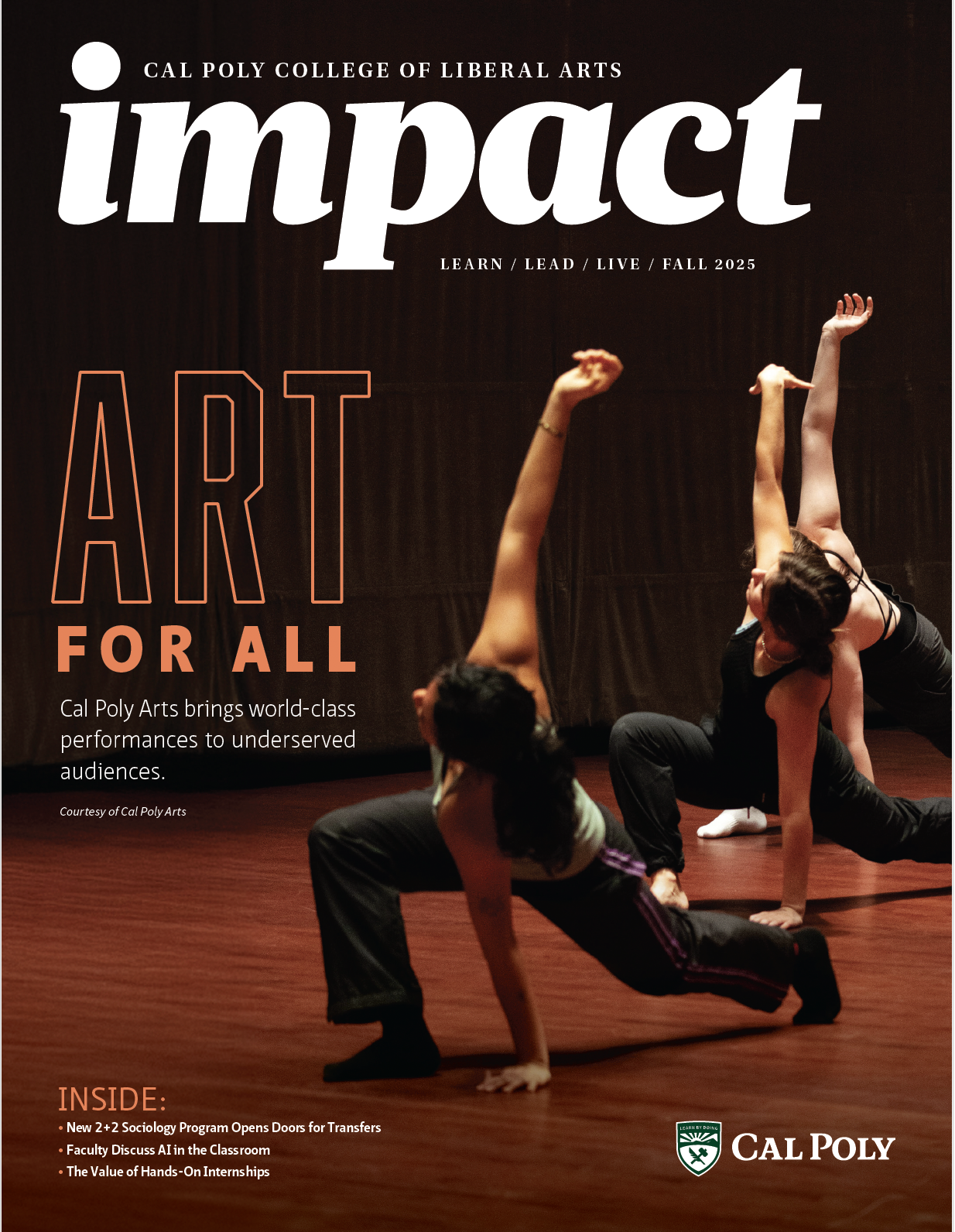Class Acts 2025
As part of Cal Poly-Cal Maritime Integration, two Cal Poly Maritime Academy departments are joining the CLA. While faculty will continue teaching at the Cal Poly Solano Campus on the shore of San Pablo Bay, their students and programs will benefit from blending Cal Poly’s Learn by Doing with Cal Poly Maritime Academy’s hands-on seafaring tradition.
Cal Poly Maritime Academy’s former Culture and Communication Department has fully integrated into the Cal Poly English Department, while the International Strategy and Security (ISS) program will be housed as a separate major within Cal Poly’s Philosophy Department.
Meet some of the CLA’s Cal Poly Maritime Academy faculty advancing Learn by Doing at the Cal Poly Solano Campus.
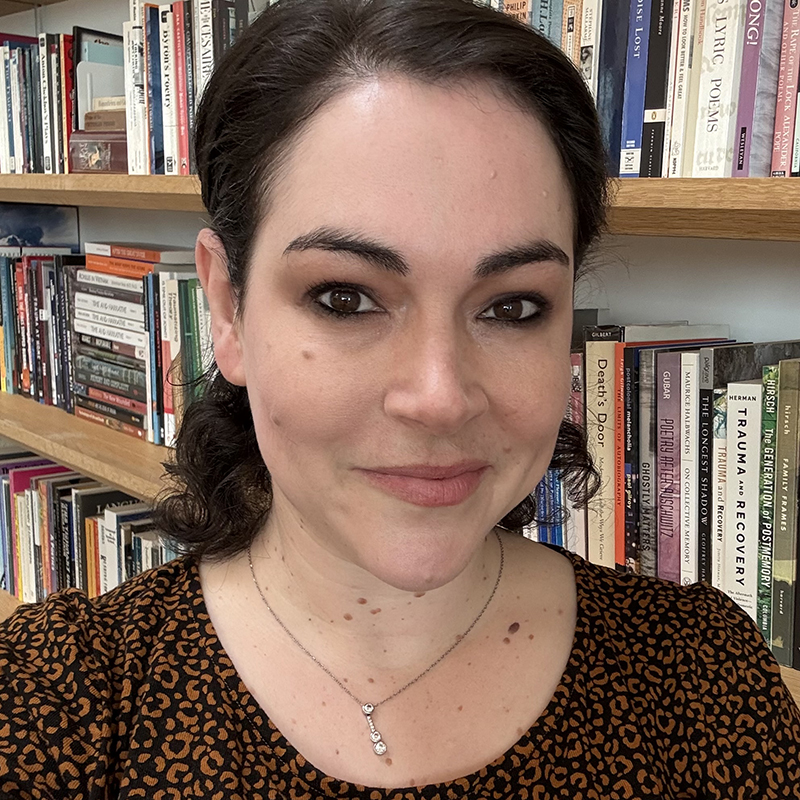
Sarah Senk (she/her)
Department:
English
Specialty Areas:
memory studies;
20th century and contemporary literature and poetry;
film and visual culture
Years at Cal Poly Maritime Academy:
9
What topics are you most passionate about exploring in your work?
My work primarily falls within the interdisciplinary field of memory studies, which explores how societies remember and make meaning from the past. I often use the term “commemorative practice” to describe my focus on how art and cultural expression respond to large-scale tragedies such as wars, genocides, natural disasters and pandemics, as well as more prolonged forms of structural violence and neglect. At its core, my research investigates how literature and culture help us process overwhelming, often incomprehensible events.
What is a recent or cool project that you’re especially excited about?
I recently teamed up with my colleague Taiyo Inoue to launch a new podcast, “My Robot Teacher.” Funded by California Education Learning Lab, the show explores the intersection of artificial intelligence and education — from its practical use in the classroom to its impact on the roles of students and educators in a rapidly evolving tech landscape. You can find us on Apple Podcasts, Spotify and YouTube. You can learn more by visiting calearninglab.org/myrobotteacher/.
I am an advisor to the national nonprofit, Marked By COVID, that is creating a national virtual reality (VR) COVID-19 memorial. We asked Snapchat to partner with us to fund a VR lens, and they actually created a prototype pro bono. You can download the lens at markedbycovid.com/memorial, take a photo at local COVID memories or hospitals, and when you take a photo, a spiral of names and faces will appear.
How does Learn by Doing shape your approach to teaching?
Cal Poly Maritime Academy is deeply rooted in experiential learning — Learn by Doing is at the core of everything we do. So how does that translate into a literature course? In my classes, students are constantly engaging in multiple lines of interpretation and inquiry, learning to assess and evaluate them with objectivity. Before the rise of AI, students often collaborated on essays to develop critical thinking and communication skills. Today, we’ve adapted by incorporating tools like ChatGPT to foster AI literacy, which I believe is an essential skill in our current world.
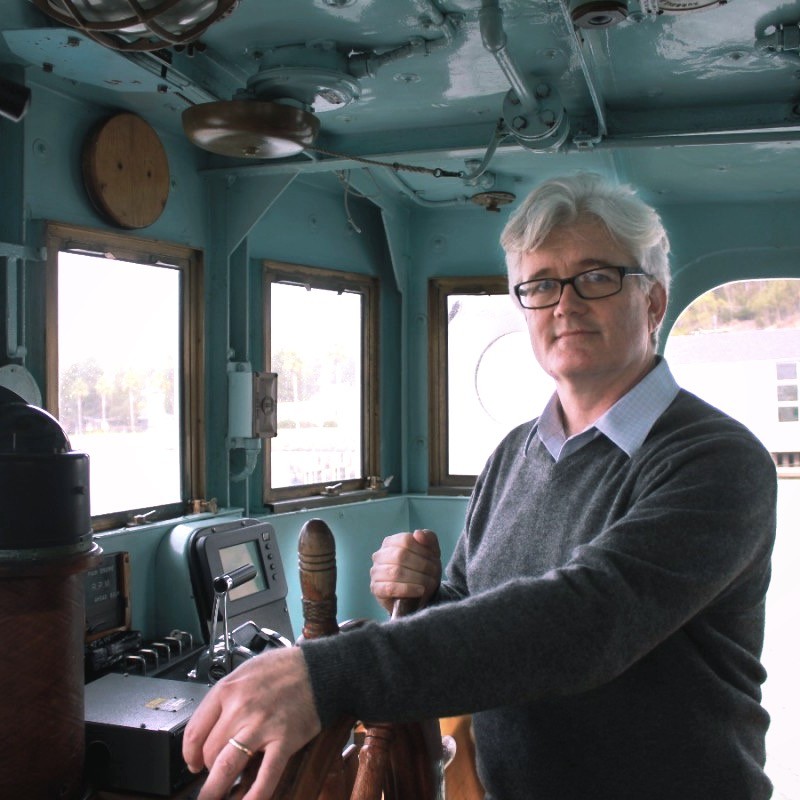
Colin Dewey (he/they)
Department:
English
Specialty Areas:
British poetry of the 18th century; maritime culture;
21st century globalized logistics
Years at Cal Poly Maritime Academy: 13
What drew you to study English and maritime culture?
I came to higher education as a non-traditional community college transfer student working full-time as captain of the San Francisco pilot vessel “California.” I had sailed as a merchant seaman in commercial vessels worldwide from the early 1980s until joining the San Francisco Bar Pilots in 1992. In 2001, I left to enroll full time at UC Berkeley and later in the English graduate program at Cornell University. I was initially going to study affect and revolutionary sentiment in Romanic literature, but my advisor said, given my extensive experience as a seaman, “Why don’t you just write about the sea?” And so, I did, and I’ve never looked back.
What is a recent or cool project that you’re especially excited about?
A cool project that I’ve been working on is developing and defining the field of Oceanic Humanities. I’ve been collaborating with a group of scholars led by Stanford University Professor Margaret Cohen to imagine a truly interdisciplinary humanities curriculum integrated with ocean science. The Cal Poly Solano Campus is an ideal laboratory for this work, since we have dedicated oceanic studies faculty in humanities, oceanography and maritime practice –– the three legs that we’ve identified as essential to a comprehensive oceanic studies curriculum
What is the most unique class that you teach?
Maritime Culture is an upper division course that examines the origins of many aspects of seafaring life that the general public assumes to be true, like burly, rowdy sailors who drink too much alcohol and get in fights; myths like “women are bad luck on ships”; the idea that sailors are always patriotic, loyal protectors of their nation and more.
This class started as a direct challenge to the ideas about the profession many maritime students came in with that I knew to be false, harmful or both. We begin with 18th century landscape painting and progress thematically through recent Hollywood films about sailors and the sea. The class is unique in that students are encouraged to produce their own artistic or creative projects instead of a traditional term paper.
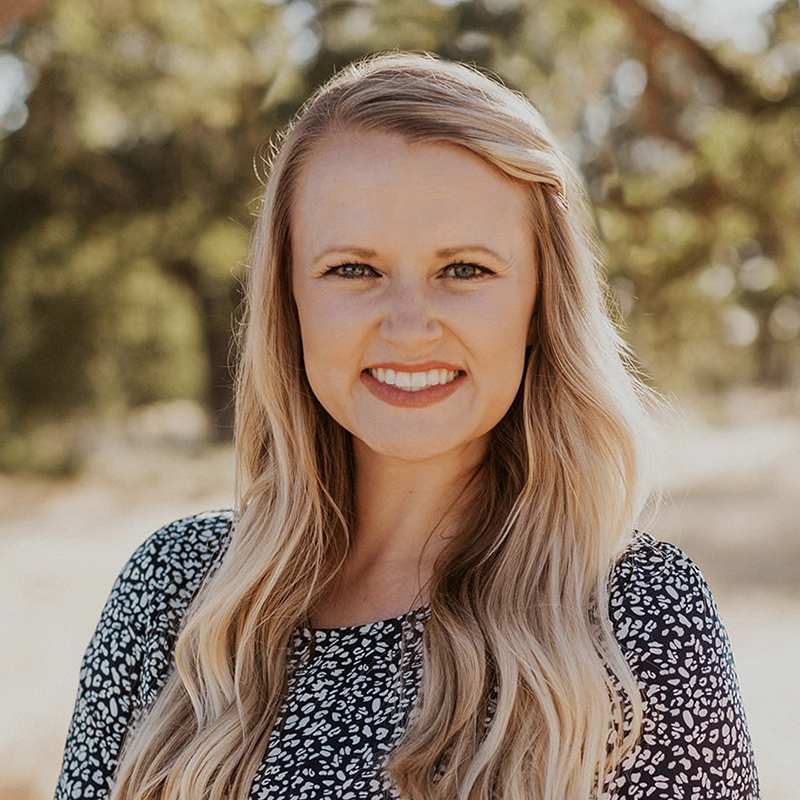
Amy Skoll
Department:
Philosophy, ISS program
Specialty Areas:
external intervention in civil conflicts;
international migration;
maritime foreign policy
Years at Cal Poly Maritime Academy:
4
What are your research or scholarly pursuits?
My primary area of research is on external intervention in civil conflicts, which stems from my longstanding passion to understand why conflicts occur and how we can prevent and resolve them. In January 2025, I had an article published in the peer-reviewed journal, Small Wars & Insurgencies, titled “Rebel Group Branding and External Intervention,” which evaluates how perceptions of rebel groups can affect variation in the level and type of external intervention present in a conflict (e.g. military, diplomatic, economic, etc.).
What is your favorite class to teach?
I have the immense pleasure of teaching our senior-level civil conflict course, which requires students to dive into quantitative scholarly research on civil conflicts. I love watching students think critically about research design and causal inference and evaluate the policy implications of academic research. The semester culminates in a final presentation where students must apply research to a real-world case of civil conflict and present the policy recommendations and/or implications to their classmates as if it were a professional policy presentation.
What meaning or purpose do you find in teaching?
While I have a wide range of research interests, teaching and mentoring students remain at the heart of my work. I’m deeply committed to preparing the next generation of leaders who are prepared to tackle the world’s biggest challenges. In every course I teach, I emphasize self-reflection, leadership development, truth-seeking and data-informed decision-making, all within the context of an increasingly complex and nuanced world. As a Cal Poly political science 2013 alum myself, I am excited to return to my alma mater to continue building up the next generation of leaders alongside my new CLA colleagues. This mission brings life to my work.
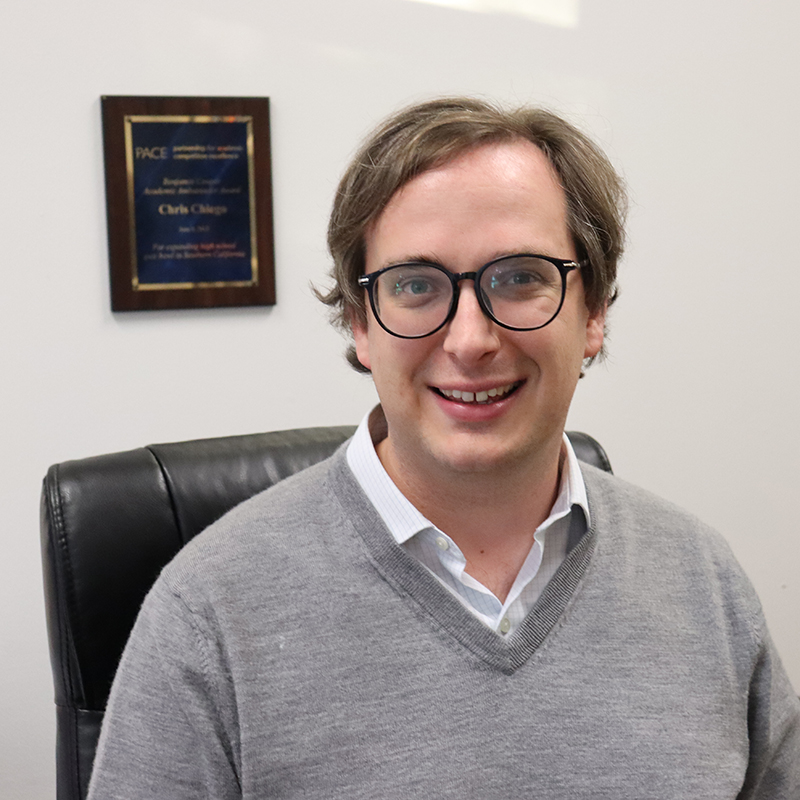
Christopher Chiego
Department:
Philosophy, ISS program
Specialty Area:
How people and states learn from war and conflict
Years at Cal Poly Maritime Academy: 5
What drew you to this particular area of study?
I’ve always been fascinated by why people fight each other over political issues, and what the legacy of that conflict is today. I’m particularly interested in why some wars appear to decisively resolve the issues at stake, while others are followed by repeated or renewed conflict. All around us we see monuments, histories and debates about what previous conflicts meant. I'm curious how that can help us make better decisions today.
What kind of real-world problems do students tackle in your courses?
Simulations are a core feature of education at Cal Poly Maritime Academy, and I incorporate them heavily into my courses. In Model United Nations, students engage in multiple simulations, representing countries or individuals in varied contexts. In U.S. Foreign Policy, students research members of the National Security Council and role-play them in a weeklong simulation responding to a chemical weapons attack. In Polar Politics, students simulate the Arctic Council, navigating consensus building among member states and indigenous groups.
What is a recent project that you’re especially excited about?
Over the past year, I have been working on a project to catalog every seaborne invasion in an international or internal war within the past 200 years. A team of volunteer undergraduate research assistants has helped me sort through a large number of historical cases and materials as we seek to understand why some seaborne invasions succeed and others fail. I am excited to see how the project will progress as we analyze the full universe of cases and apply insights from the data to analyze current situations such as a potential conflict over Taiwan.

